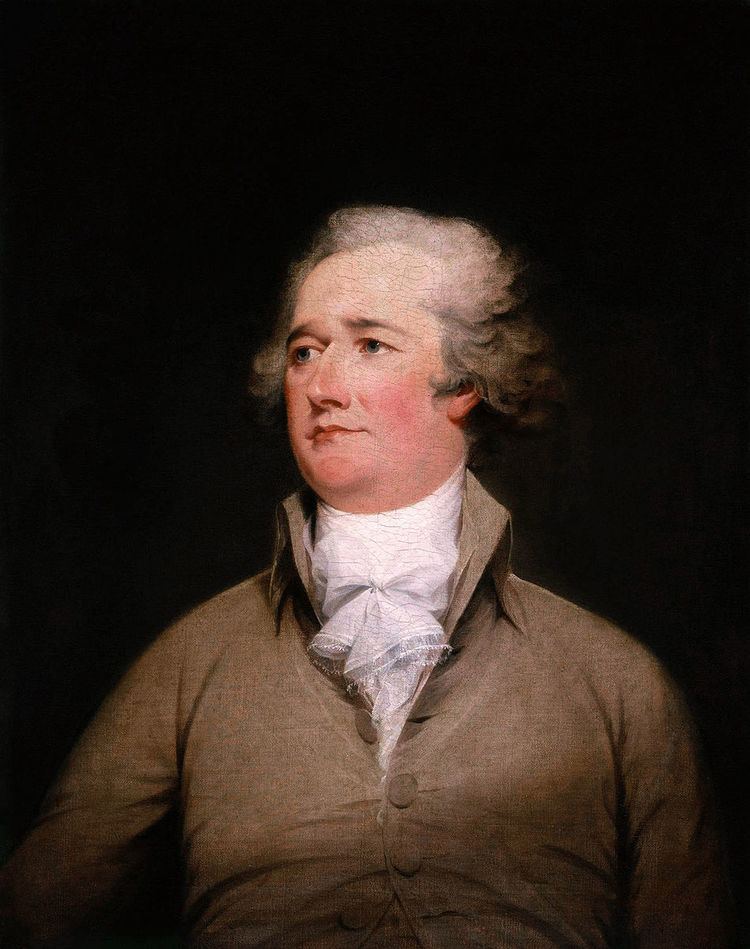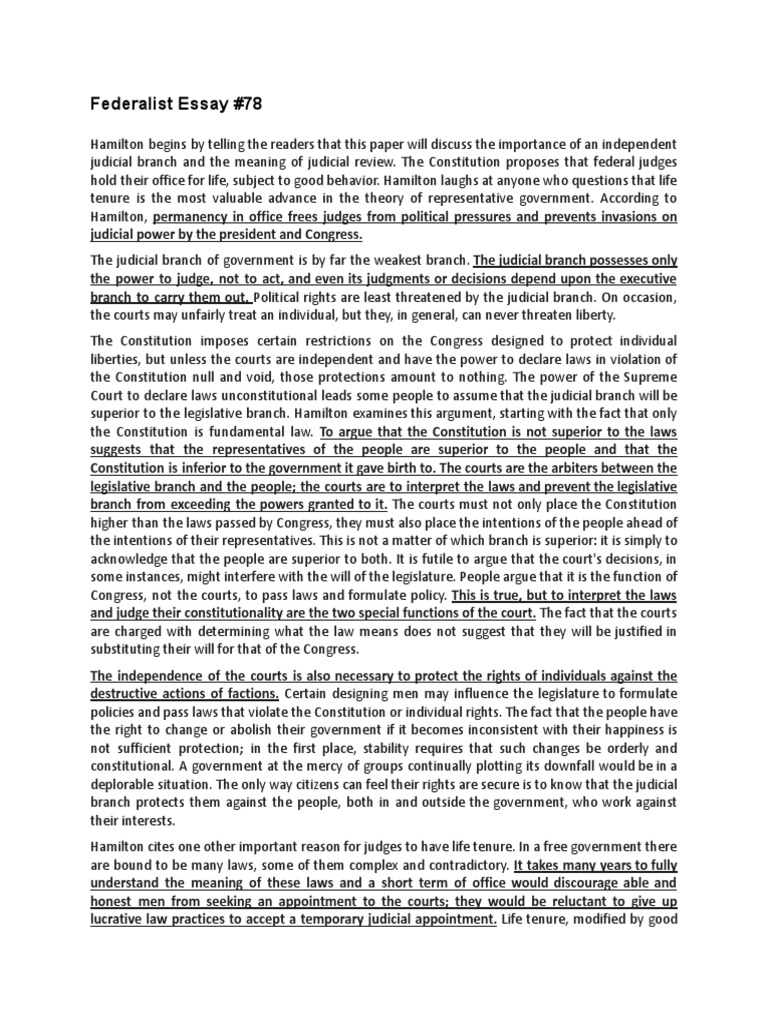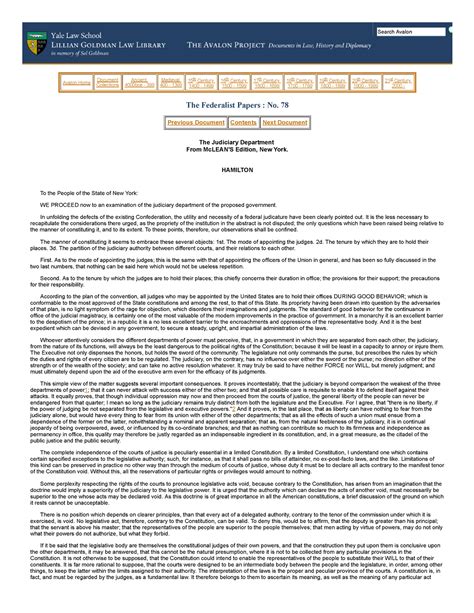Federalist No. 78

The judiciary, as one of the three branches of government, has been a subject of intense debate and discussion since the inception of the United States. In Federalist No. 78, Alexander Hamilton delves into the role of the judiciary, exploring its powers, limitations, and the potential risks associated with its authority. Written in 1788, this seminal essay provides valuable insights into the thinking of the Founding Fathers and their vision for the federal judiciary.
At the heart of Federalist No. 78 is Hamilton’s argument that the judiciary is the weakest of the three branches of government. He contends that the legislative branch, with its power to make laws, and the executive branch, with its authority to enforce them, are inherently stronger than the judiciary, which is limited to interpreting laws. This assertion may seem counterintuitive, given the significant role that the judiciary has come to play in American politics. However, Hamilton’s point is that the judiciary’s power is derived from its ability to declare laws unconstitutional, rather than from any direct authority to make or enforce laws.
One of the key concerns addressed in Federalist No. 78 is the potential for the judiciary to overstep its bounds and usurp the authority of the other branches. Hamilton recognizes that the judiciary’s power of judicial review, which allows it to declare laws unconstitutional, is a significant one. However, he argues that this power is necessary to prevent the other branches from abusing their authority and to ensure that the Constitution is upheld. He also notes that the judiciary is subject to various checks and balances, such as the possibility of impeachment and the requirement that judges be appointed by the President and confirmed by the Senate.
Hamilton also explores the concept of judicial independence, which he sees as essential to the proper functioning of the judiciary. He argues that judges should be free from political interference and should be able to make decisions based solely on their interpretation of the law. This, he believes, is necessary to ensure that the judiciary remains a neutral and impartial arbiter of the law, rather than a tool of political exploitation.
In addition to its discussion of the judiciary’s powers and limitations, Federalist No. 78 also provides insight into the thinking of the Founding Fathers on issues such as the role of the judiciary in a democratic society and the importance of an independent judiciary. Hamilton’s essay reflects the Founders’ concern with creating a system of government that would be responsive to the needs of the people, while also protecting individual rights and preventing the abuse of power.
Overall, Federalist No. 78 remains a seminal work in American political theory, offering valuable insights into the role of the judiciary and the system of government established by the Founding Fathers. Its discussion of the judiciary’s powers, limitations, and potential risks continues to resonate with contemporary debates about the proper role of the judiciary in American society.
The Importance of Judicial Independence

Judicial independence is a crucial aspect of the American system of government, as it allows judges to make decisions based solely on their interpretation of the law, without fear of political reprisal or interference. This independence is essential to the proper functioning of the judiciary, as it enables judges to act as a check on the other branches of government and uphold the Constitution.
Steps to Ensure Judicial Independence
- Appointment and confirmation process: The process of appointing and confirming judges should be designed to ensure that judges are chosen based on their qualifications and integrity, rather than their political affiliations or ideologies.
- Life tenure: The provision of life tenure for judges helps to insulate them from political pressure and allows them to make decisions without fear of reprisal.
- Protection from impeachment: The possibility of impeachment provides a check on judges who may abuse their power, while also protecting them from unfounded or politically motivated attacks.
The Role of the Judiciary in a Democratic Society

The judiciary plays a vital role in a democratic society, serving as a check on the other branches of government and upholding the Constitution. The judiciary’s power of judicial review allows it to declare laws unconstitutional, preventing the other branches from abusing their authority and ensuring that the Constitution is upheld.
Arguments For and Against a Strong Judiciary
Arguments For a Strong Judiciary
- The judiciary provides a check on the other branches of government, preventing them from abusing their authority.
- The judiciary upholds the Constitution, ensuring that the rights of individuals are protected.
- A strong judiciary promotes the rule of law, providing a stable and predictable environment for business and commerce.
Arguments Against a Strong Judiciary
- A strong judiciary can be seen as undemocratic, as it allows unelected judges to make decisions that affect the lives of citizens.
- The judiciary may overstep its bounds, declaring laws unconstitutional that are popular with the public.
- A strong judiciary can create uncertainty and instability, as its decisions may be unpredictable and subject to change.
Conclusion
In conclusion, Federalist No. 78 provides a comprehensive and nuanced exploration of the role of the judiciary in the American system of government. Its discussion of the judiciary’s powers, limitations, and potential risks continues to resonate with contemporary debates about the proper role of the judiciary in American society. The importance of judicial independence, the role of the judiciary in a democratic society, and the potential risks and benefits of a strong judiciary are all critical issues that continue to shape American politics and society.
What is the main argument of Federalist No. 78?
+The main argument of Federalist No. 78 is that the judiciary is the weakest of the three branches of government, but its power of judicial review is necessary to prevent the other branches from abusing their authority and to ensure that the Constitution is upheld.
Why is judicial independence important?
+Judicial independence is important because it allows judges to make decisions based solely on their interpretation of the law, without fear of political reprisal or interference.
What are the potential risks of a strong judiciary?
+The potential risks of a strong judiciary include the possibility that it may overstep its bounds, declare laws unconstitutional that are popular with the public, and create uncertainty and instability.


